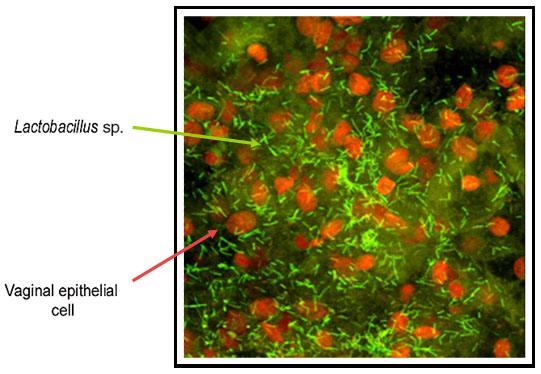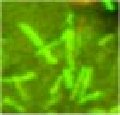Lactobacillus jensenii: Difference between revisions
| Line 25: | Line 25: | ||
From the genus Lactobacillus, L. jensenii is a "facultatively anaerobic, catalase-negative, none-spore-forming, Gram Positive, rod-shaped" bacteria. This particular strain is one of the predominant species(along with Lactobacillus crispatus) found in the female lower genital tract. Because of its ________, L. jensenii has been isolated from vagina of healthy women and its 1153 genome has been sequenced by shotgun approach. | From the genus Lactobacillus, L. jensenii is a "facultatively anaerobic, catalase-negative, none-spore-forming, Gram Positive, rod-shaped" bacteria. This particular strain is one of the predominant species(along with Lactobacillus crispatus) found in the female lower genital tract. Because of its ________, L. jensenii has been isolated from vagina of healthy women and its 1153 genome has been sequenced by shotgun approach. | ||
[[Image: LactoBacillus_2.jpg|thumb|350px| | [[Image: LactoBacillus_2.jpg|thumb|350px|left|''Lactobacillus jensenii''. From [http://www.science-shop.de/sixcms/detail.php?id=847719&skip=10]]] | ||
So far, its pathogenicity for men is unknown. | So far, its pathogenicity for men is unknown. | ||
Revision as of 01:37, 29 April 2007

Classification
Higher order taxa
Bacteria; Firmicutes; Bacilli; Lactobacillales; Lactobacillaceae; Lactobacillus
Genus
Lactobacillus jensenii
|
NCBI: Taxonomy |
Description and significance
Describe the appearance, habitat, etc. of the organism, and why it is important enough to have its genome sequenced. Describe how and where it was isolated. Include a picture or two (with sources) if you can find them.
From the genus Lactobacillus, L. jensenii is a "facultatively anaerobic, catalase-negative, none-spore-forming, Gram Positive, rod-shaped" bacteria. This particular strain is one of the predominant species(along with Lactobacillus crispatus) found in the female lower genital tract. Because of its ________, L. jensenii has been isolated from vagina of healthy women and its 1153 genome has been sequenced by shotgun approach.

So far, its pathogenicity for men is unknown.
Genome structure
Describe the size and content of the genome. How many chromosomes? Circular or linear? Other interesting features? What is known about its sequence? Does it have any plasmids? Are they important to the organism's lifestyle?
Cell structure and metabolism
Describe any interesting features and/or cell structures; how it gains energy; what important molecules it produces.
L. jensenii could be differentiated from other species of lactobacilli by the following combination of characteristics: production of only D-lactate, hydrolysis of arginine, and fermentation of cellobiose, galactose, and ribose, but not of lactose.
Ecology
Describe any interactions with other organisms (included eukaryotes), contributions to the environment, effect on environment, etc.
Pathology
How does this organism cause disease? Human, animal, plant hosts? Virulence factors, as well as patient symptoms.
Application to Biotechnology
Does this organism produce any useful compounds or enzymes? What are they and how are they used?
Current Research
Enter summaries of the most recent research here--at least three required
References
example:
Edited by Frances Cho, student of Rachel Larsen at UCSD.
